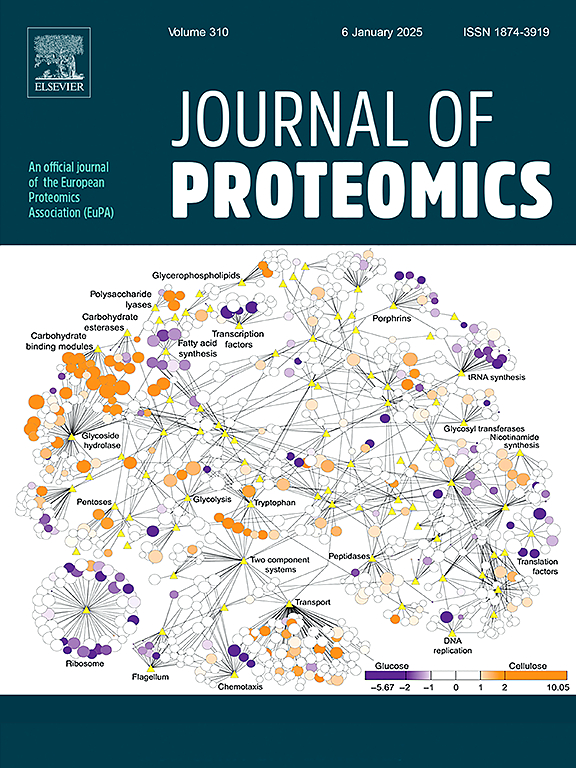Proteomic insights into the molecular mechanism of anlotinib inhibition in TP53-mutated non-small cell lung cancer
IF 2.8
2区 生物学
Q2 BIOCHEMICAL RESEARCH METHODS
引用次数: 0
Abstract
Objective
Tumor protein 53 (TP53) is the commonly mutated gene in non-small cell lung cancer (NSCLC) that is associated with poor prognosis, and anlotinib exerts inhibitory effects on TP53-mutated NSCLC. The aim of this study was to investigate the inhibitory effect of anlotinib on TP53-mutated NSCLC and its possible mechanism.
Methods
The growth ability of TP53-mutated NSCLC cells were tested by Cell counting kit-8 assay. Proteins in TP53-mutated NSCLC cells treated with anlotinib were analyzed using label-free liquid chromatography-mass spectrometry. Differentially represented proteins were analyzed by KEGG, GO, and PPIs. TP53 pathway related proteins were verified using western blotting.
Results
The cell viability was significantly reduced in TP53-mutated NSCLC cell as opposed to TP53 wild cell by anlotinib treatment. 126 differentially represented proteins (37 upregulated and 89 downregulated) were found between the anlotinib and control groups in TP53-mutated NSCLC cell. Bioinformatics analyses revealed that the differentially represented proteins were primarily involved in catalytic activity, cellular processes, and metabolite interconversion. PANTHER Classification System found that anlotinib mainly impacted the p53 signaling pathway, De novo purine biosynthesis and Integrin signaling. KEGG enrichment and PPI networks of the differentially represented proteins revealed cyclin-dependent kinase 1 (CDK1) and mitogen-activated protein kinase kinase 3 (MAP2K3) as the core protein, which are related to the p53 signaling pathway. Western blotting also revealed that anlotinib significantly suppressed the expression of CDK1 and MAP2K3 in TP53-mutated NSCLC cells, that indicated the possible mechanism may involve the MAP2K3/p53/CDK1 pathway.
Conclusions
Our findings showed that anlotinib selectively inhibited the growth of TP53-mutated NSCLC cells and downregulated the expression levels of CDK1 and MAP2K3. The MAP2K3/p53/CDK1 pathway may be the molecular mechanism underlying anlotinib's efficacy in TP53-mutated NSCLC.
Statement of significance
Tumor protein 53 (TP53) is the commonly mutated gene in non-small cell lung cancer (NSCLC) that is associated with poor prognosis, and anlotinib exerts inhibitory effects on TP53-mutated NSCLC. However, the action mechanism of anlotinib in the treatment of TP53-mutated NSCLC remains unclear.
In this study, we used label-free quantitative proteomics to reveal the molecular mechanism of anlotinib inhibition in TP53-mutated NSCLC. We found that anlotinib significantly inhibited the growth of TP53-mutated NSCLC cells and downregulated the expression levels of CDK1 and MAP2K3. The MAP2K3/p53/CDK1 pathway may be the molecular mechanism underlying anlotinib's efficacy in TP53-mutated NSCLC.
Our study promotes the use of anti-angiogenic drugs in TP53-mutated NSCLC. It provides new ideas for the treatment of TP53-mutated NSCLC.

anlotinib抑制tp53突变非小细胞肺癌分子机制的蛋白质组学研究。
目的:肿瘤蛋白53 (Tumor protein 53, TP53)是非小细胞肺癌(non-small cell lung cancer, NSCLC)中常见的突变基因,与预后不良相关,anlotinib对TP53突变的NSCLC具有抑制作用。本研究旨在探讨anlotinib对tp53突变的NSCLC的抑制作用及其可能的机制。方法:采用细胞计数试剂盒-8检测tp53突变的非小细胞肺癌细胞的生长能力。采用无标记液相色谱-质谱法分析经anlotinib处理的tp53突变的NSCLC细胞中的蛋白质。用KEGG、GO和PPIs分析差异表达蛋白。western blotting检测TP53通路相关蛋白。结果:与TP53野生细胞相比,anlotinib能显著降低TP53突变的NSCLC细胞活力。在tp53突变的NSCLC细胞中,在anlotinib组和对照组之间发现了126个差异表达蛋白(37个上调,89个下调)。生物信息学分析显示,差异代表的蛋白质主要参与催化活性、细胞过程和代谢物相互转化。PANTHER分类系统发现anlotinib主要影响p53信号通路、De novo嘌呤生物合成和Integrin信号通路。KEGG富集和差异表达蛋白的PPI网络显示,周期蛋白依赖性激酶1 (CDK1)和丝裂原活化蛋白激酶激酶3 (MAP2K3)是核心蛋白,与p53信号通路相关。Western blotting还发现,anlotinib显著抑制tp53突变的NSCLC细胞中CDK1和MAP2K3的表达,提示其机制可能与MAP2K3/p53/CDK1通路有关。结论:我们的研究结果表明,anlotinib选择性地抑制tp53突变的NSCLC细胞的生长,下调CDK1和MAP2K3的表达水平。MAP2K3/p53/CDK1通路可能是anlotinib治疗tp53突变的NSCLC的分子机制。意义说明:肿瘤蛋白53 (Tumor protein 53, TP53)是非小细胞肺癌(non-small cell lung cancer, NSCLC)中常见的突变基因,与预后不良相关,而安洛替尼对TP53突变的NSCLC有抑制作用。然而,anlotinib治疗tp53突变NSCLC的作用机制尚不清楚。在这项研究中,我们使用无标记定量蛋白质组学来揭示anlotinib抑制tp53突变的NSCLC的分子机制。我们发现,anlotinib显著抑制tp53突变的NSCLC细胞的生长,下调CDK1和MAP2K3的表达水平。MAP2K3/p53/CDK1通路可能是anlotinib治疗tp53突变的NSCLC的分子机制。我们的研究促进抗血管生成药物在tp53突变的非小细胞肺癌中的应用。为tp53突变的非小细胞肺癌的治疗提供了新的思路。
本文章由计算机程序翻译,如有差异,请以英文原文为准。
求助全文
约1分钟内获得全文
求助全文
来源期刊

Journal of proteomics
生物-生化研究方法
CiteScore
7.10
自引率
3.00%
发文量
227
审稿时长
73 days
期刊介绍:
Journal of Proteomics is aimed at protein scientists and analytical chemists in the field of proteomics, biomarker discovery, protein analytics, plant proteomics, microbial and animal proteomics, human studies, tissue imaging by mass spectrometry, non-conventional and non-model organism proteomics, and protein bioinformatics. The journal welcomes papers in new and upcoming areas such as metabolomics, genomics, systems biology, toxicogenomics, pharmacoproteomics.
Journal of Proteomics unifies both fundamental scientists and clinicians, and includes translational research. Suggestions for reviews, webinars and thematic issues are welcome.
 求助内容:
求助内容: 应助结果提醒方式:
应助结果提醒方式:


